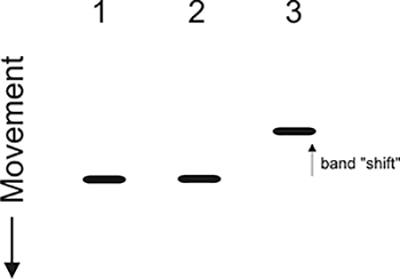As a leader specialized in RNA-protein interaction analysis, Lifeasible has acquired extensive experience and expert knowledge in RNA-protein interaction study. RNA electrophoretic mobility shift assay (EMSA) is an in vitro technique commonly employed in a primary characterization of RNA-protein interactions. Lifeasible offers RNA EMSA service with high sensitivity and efficiency.
The RNA EMSA, also known as the gel retardation assay, takes advantage of the fact that protein-associated nucleic acids migrate more slowly than free probes in native polyacrylamide gel (Figure 1).
 Figure 1. The principle of an RNA EMSA (Wikipedia)
Figure 1. The principle of an RNA EMSA (Wikipedia)
Lane 1 is a negative control and contains only genetic material. Lane 2 contains protein as well as an RNA fragment that does not interact. Lane 3 contains protein and an RNA fragment that does interact, causing a shifted band.
Generally, a conventional RNA EMSA protocol consists of five steps, including:
We provide one-site RNA EMSA service from sample preparation to data interpretation. We will be happy to discuss details of intended RNA-protein interaction studies with you and develop experimental strategies tailored to your requirement. Please feel free to contact us for any further information on our services or assistance you might need.
Lifeasible has established a one-stop service platform for plants. In addition to obtaining customized solutions for plant genetic engineering, customers can also conduct follow-up analysis and research on plants through our analysis platform. The analytical services we provide include but are not limited to the following:
July 13, 2024